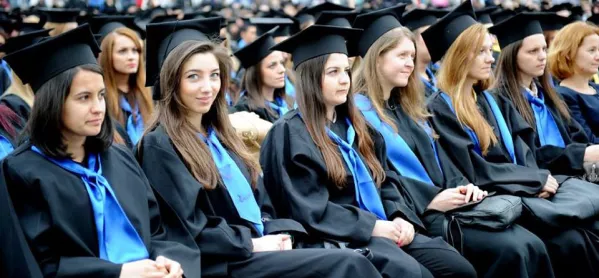
- Home
- ‘Why my university banned unconditional offers’
‘Why my university banned unconditional offers’

When I made the opening speech to a teaching conference in May, I referred to our institutional heritage in teacher education here at the University of Chichester - a heritage stretching back nearly 180 years.
That heritage informs our current provision of a distinctive academic experience, that is high-quality, personalised, accessible and aspirational, and that is genuinely student-centred.
I am proud to be associated with this, being the daughter of two secondary school teachers who strove throughout their professional lives to enhance the confidence, social capital and broader opportunities - some in tertiary education - of the pupils they taught.
The current practice of unconditional offer-making by higher education institutions, to 18-year-old applicants who have not yet completed their level 3 qualifications (A levels, BTECs or combination), began in earnest a few years ago, and has now permeated a sharply competitive HE sector.
One in four receive an unconditional offer
Times Higher Education reported annual growth of unconditional offer-making to pre-entry qualification applicants in England, Wales and Northern Ireland of just over 40 per cent, and nearly one in four of these applicants now receives at least one unconditional offer.
The increase in tuition fees, the removal of controls on student numbers at higher education institutions and a demographic drop in the number of 18- to 20-year-olds between 2014-21 of 10 per cent has provided both incentive and need for universities to compete ever more vigorously on recruitment.
While the universities minister, Sam Gyimah, is highly critical of the growth in unconditional offers and expects universities to lead by limiting the number offered, Universities UK chief executive, Alistair Jarvis, defends the practice on the basis that universities will self-regulate on entrant capability, and head of the Higher Education Policy Institute, Nick Hillman, champions university admissions autonomy as a key to a liberal and self-determining higher education sector.
At the University of Chichester, we discussed the practice of unconditional offer-making to those applicants who still have their predicted rather than actual grades, weighing what we perceived as the “easy-win” of making such offers against a strong message from our Teachers and Advisors Conference in 2017.
Detering pupils from reaching full potential
The message was that unconditional offer making was leading to pupils becoming demotivated, decelerated in their learning at level three, and deterred from reaching their full potential at school or college.
In making our decision, we took into account Ucas research showing that applicants holding unconditional offers are 23 per cent more likely to fall short on predicted A-level grades than their peers with conditional offers.
We also considered the work that schools and colleges staff undertake to ensure their pupils perform to the best of their ability in their post-16 qualifications, with those qualifications continuing to be important in securing work placements and internships during university and in the preparation of graduate entry job applications.
And we also listened to parents at our open days expressing concern that unconditional offer-making would leave their children vulnerable, under-prepared for, and under-performing on the university course they eventually gain entry to.
The University of Chichester is characterised by our deep and serious commitment to our students, and we take great pride in our high levels of retention, progression and good degree completion.
‘The correct ethical decision’
We want to ensure that our applicants make wise decisions about their university, their education and their future, and we, therefore, took what we believe was the correct ethical decision to make only conditional offers to applicants yet to complete their level 3 qualifications.
Our strategy is not without risk in the current climate, but it does reflect our educational ethos. While we know that some applicants will be reassured and even flattered by an unconditional offer, we are unconvinced that the practice is in their best long-term interests, and this latter is what is important to us as educators.
We continue to be grateful to the schools and colleges that have supported us to hold this position by promoting the University of Chichester as the quality university of the region, a natural path for those we collectively value - our young people.
We will hold this line in spite of the pressures otherwise as long as it is possible, and remain hopeful that intervention by government, Office for Students and/or Ucas will render the practice of unconditional offer-making to those 18-year-old applicants who have not yet completed their level 3 qualifications swiftly obsolete.
Professor Catherine Harper is deputy vice-chancellor at the University of Chichester
Register with Tes and you can read five free articles every month, plus you'll have access to our range of award-winning newsletters.
Keep reading for just £4.90 per month
You've reached your limit of free articles this month. Subscribe for £4.90 per month for three months and get:
- Unlimited access to all Tes magazine content
- Exclusive subscriber-only stories
- Award-winning email newsletters
You've reached your limit of free articles this month. Subscribe for £4.90 per month for three months and get:
- Unlimited access to all Tes magazine content
- Exclusive subscriber-only stories
- Award-winning email newsletters